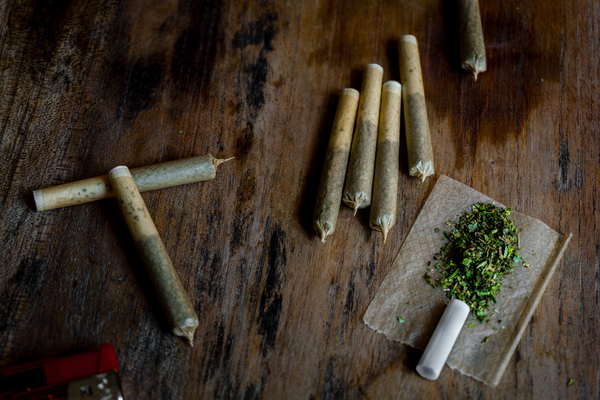By Pastor Andrews - Oct 18, 2022 #drugs #enjoyment #intoxication
The Believer’s High

We’ve reached a place in our culture where most people either smoke marijuana or know someone who does, either for recreation or medicinal purposes. According to a 2020 Gallup Poll, 68 percent of Americans say it should be legalized--which it is in 19 states for recreational use (and 38 states for medicinal use). Maryland voters will decide this fall whether to legalize the recreational use of marijuana. Many Christians are supportive of marijuana use, citing that it’s now legal (or decriminalized) in many states, there’s no clear biblical prohibition, and it’s no different than drinking alcohol. Perhaps you’ve wondered about this or even considered experimenting with cannabis yourself?
Here’s some things you should consider.
First, it’s all about the high. World Magazine recently reported on the nitrous oxide problem that has emerged in recent years. This gas, said to be harmless, is used as an analgesic by doctors (aka "laughing gas") and by food companies in cans of whipped cream. Known as “whip-its,” the inhalant has more than 12 million users, according to the Substance Abuse and Mental Health Services Administration. It’s gotten to the point where convenience stores in New York require ID to purchase whipped cream! Teens disperse the gas into balloons to inhale and gain short term euphoria.
People use marijuana for the same reason. It’s all about the high. And let’s face it, the term “high” is synonymous with intoxication. I may have an occasional glass of wine, but the purpose is never to achieve some kind of high. In their book, Can I Smoke Pot: Marijuana in Light of Scripture, Tom Breeden and Mark Ward argue that the Bible draws the line with alcohol at drunkenness. Intoxication is sin, and given the small amount of pot required to achieve a high, the argument of moderation is not credible.
Second, ask yourself why does one have the desire to get high? Research indicates that users are looking to escape the pressures and problems of life. Breeden and Ward pose the following questions: “What are you really craving, and why are you pushing this point so hard? Are you effectively seeking a kind of palliative care to soothe some emotional or spiritual pain in your life? A pain that God will gladly soothe if you only draw near to him through his Word and prayer."
Writing for The Gospel Coalition, Kevin J. Vanhoozer, research professor of systematic theology at Trinity Evangelical Divinity School writes: “What Augustine says in On Christian Doctrine about the difference between using and enjoying things applies to recreational marijuana too. The only thing to be enjoyed for its own sake—loved—is the triune God. Those who use pot to enjoy getting high risk using creation to enjoy something other than God Most High.”
Third, the harmful effects of long-term marijuana use are well documented. There are literally hundreds of marijuana products that deliver THC, the chemical that produces the desired high. According to the National Institute on Drug Abuse,* effects of marijuana use include impaired memory and body movement, delusion, psychosis, and impaired brain development. As for the use of nitrous oxide, studies indicate that hypoxia, collapsed lungs, and death may occur.
As Christians, we understand that we are to glorify God in our bodies. Therefore, the effects these substances produce are not only harmful but sinful. The New Testament exhorts believers to be vigilant and sober-minded. The fruit of the Spirit leads to self-control whereas marijuana’s effect is just the opposite. As Vanhoozer writes:
C. S. Lewis described his conversion as an awakening, and we might describe discipleship as the project of helping Christ-followers to stay awake: alert to the privilege and responsibility of living out their citizenship of the gospel always, everywhere, and before everyone.
Much like the spell the green lady cast over Jill, Eustace, and Puddleglum in Lewis’s The Silver Chair, marijuana clouds our ability to perceive the world clearly and dulls our sense of urgency about what disciples should be doing.
Finally, we should remember Paul’s words: “All things are lawful for me, but not all things are helpful” (1 Cor. 6:12). In other words, what may be permissible is not always wise. The apostle went on to say, “All things are lawful for me, but I will not be dominated by anything. . . All things are lawful, but not all things build up” (1 Cor. 6:12; 10:23). Certainly this applies to recreational drug use.
Recreational use of marijuana or other mind-altering drugs has no place in the life of a believer. In addition to the detrimental physical and mental effects, it also produces an individualistic bent that contributes to disengagement and isolation from others. As stewards of the grace of God, we are not only responsible for how we work but also for how we relax, and it shouldn’t take a doobie to find peace.
As for medicinal use, I refer you to the following article: